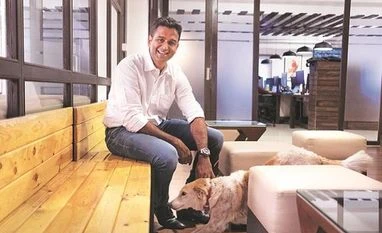In less than a decade, Zerodha has managed to become the No. 1 player in terms of the number of active clients in the hyper-competitive broking space. In an interview with Samie Modak, NITHIN KAMATH, founder and chief executive officer of the Bengaluru-based tech start-up — which disrupted the industry with zero-brokerage plans — says the industry has moved away from pricing to product offerings. Edited excerpts:
How did Zerodha manage to crack the broking industry?
We got lucky. We didn’t get enough competition along the way. We think of us as a tech business; this whole broking thing is incidental. An apple-to-apple comparison would be a tech company doing broking. Demonetisation also provided an impetus. Earlier, on-boarding a customer was the biggest challenge. This Aadhaar-based know-your-customer made it really easy. That’s the only reason we came on the scene. Established players leveraged their physical presence. A digital-only player would never have been able to match that. Once that thing was broken, it was easy for someone like us to disrupt the place.
Zerodha is criticised for frequent outages.
The issue is blown out of proportion. In the last 14 months, we have had three incidents. Google, Facebook or Amazon would have had more incidents. I don’t think any tech business is insulated from this. But the problem with our business is when we are down, we are causing a notional profit or a loss. Also, our client base is young and social media savvy and hence, these things get amplified.
Zerodha has the maximum number of active clients. What is your revenue market share?
The industry size is between Rs 8,000 crore and Rs 10,000 crore. Exchange transaction charges get added to the revenues. But if you take out that, last year we did around Rs 700 crore, which included proprietary trading (prop). This year, we will do around Rs 800 crore of pure retail broking, excluding prop.
Now that you have established yourself, is there a temptation to raise charges?
We are thinking of premium offerings and certain new products. We are working hard at the backend. A lot of people think the broking business is about pricing. It has stopped being about pricing long ago. It is all about products. Product development takes time. We have taken four-five years. Most new players used vendor-based products.
We have only a few stock market participants.
The real question is how many of the 1.3 billion people make money. People who trade will be ones who make money. The entire audience for the industry is not more than 50 million. That is a stretch. So the participants are around 7 million, which is 14 per cent of the addressable market. I’d say that’s not so bad.
Any plans to go public?
As a business, we don’t require money. But people in our office have stock options. We need to give them liquidity at some point in time. Our fortunes are closely tied to the stock markets. We are like a high-beta stock. With so much volatility in our business, raising money from the public could be a challenge. We need to build other verticals that will take away some of this volatility. We have a non-banking financial company licence. We are starting loan-against-securities and margin funding.
Given your technology prowess, do you plan to venture into areas outside the capital markets?
Our core competency is built here. If we pick up any new industry, it could stretch us thin. Then we will be susceptible. I’d rather focus on one field and dominate.
But you can always tap the private equity market…
The best part of my life is not being answerable to anyone. I don’t want to lose that. Also, not having raised outside money we could run this business the way we want to. Once you raise money, your business gets wired to revenues and growth numbers. Our target is around products. Revenue is never spoken about. That’s the biggest edge we have.
When do you expect the next boom in the markets? How do you position yourself to gain from it?
If there is a boom in the equity markets, we are best placed to gain from it. But will it really happen? The macro of this country has to improve. We don’t know who the next big job creator will be.
Unlock 30+ premium stories daily hand-picked by our editors, across devices on browser and app.
Pick your 5 favourite companies, get a daily email with all news updates on them.
Full access to our intuitive epaper - clip, save, share articles from any device; newspaper archives from 2006.
Preferential invites to Business Standard events.
Curated newsletters on markets, personal finance, policy & politics, start-ups, technology, and more.
)